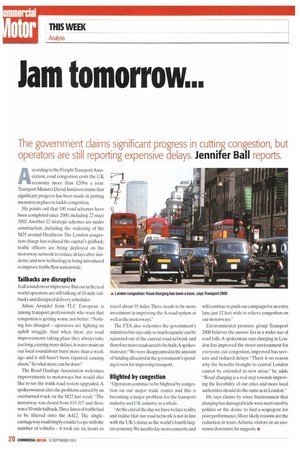Jam tomorrow...
Page 20

If you've noticed an error in this article please click here to report it so we can fix it.
The government claims significant progress in cutting congestion, but
operators are still reporting expensive delays. Jennifer Ball reports.
According to the Freight Transport Association, road congestion costs the UK economy more than £20bn a year. Transport Minister David Jamieson insists that significant progress has been made in putting measures in place to tackle congestion.
He points out that 100 road schemes have been completed since 2000, including 22 since 2002. Another 12 strategic schemes are under construction, including the widening of the M25 around Heathrow. The London congestion charge has reduced the capital's gridlock; traffic officers are being deployed on the motorway network to reduce delays after incidents; and new technology is being introduced to improve traffic flow nationwide.
Tailbacks are disruptive
It all sounds most impressive. But out in the real world operators are still talking of 10-mile tailbacks and disrupted delivery schedules.
Julian Arundel from TLC European is among transport professionals who warn that congestion is getting worse, not better: "Nothing has changed — operators are fighting an uphill struggle. And when there are road improvements taking place they always take too long, causing more delays, A water main on our local roundabout burst more than a week ago and it still hasn't been repaired, causing chaos." So what more can be done?
The Road Haulage Association welcomes improvements to motorways but would also like to see the trunk road system upgraded. A spokeswoman cites the problems caused by an overturned truck on the M25 last week: "The motorway was closed from J15-J17 and there was a 10-mile tailback.Three lanes of traffic had to be filtered onto the A412. The singlecarriageway road simply couldn't cope with the number of vehicles — it took me six hours to travel about 35 miles. There needs to be more investment in improving the A-road system as well as the motorways.
The FTA also welcomes the government's initiatives but says only so much capacity can be squeezed out of the current road network and therefore more roads need to be built.A spokesman says:"We were disappointed in the amount of funding allocated in the government's spending review for improving transport.
Blighted by congestion "Operators continue to be blighted by congestion on our major trade routes and this is becoming a major problem for the transport industry and UK industry as a whole.
"At the end of the day we have to face reality and realise that our road network is not in line with the UK's status as the world's fourth largest economy.We need to lay more concrete, and will continue to push our campaign for an extra lane just 12 feet wide to relieve congestion on our motorways."
Environmental pressure group Transport 2000 believes the answer lies in a wider use of road tolls. A spokesman says charging in London has improved the street environment for everyone, cut congestion, improved bus services and reduced delays. "There is no reason why the benefits brought to central London cannot be extended to new areas," he adds. "Road charging is a real step towards improving the liveability of our cities and more local authorities should do the same as in London."
He says claims by some businessmen that charging has damaged trade were motivated by politics or the desire to find a scapegoat for poor performance. More likely reasons are the reduction in trans-Atlantic visitors or an economic downturn, he suggests. •






































































































































































































